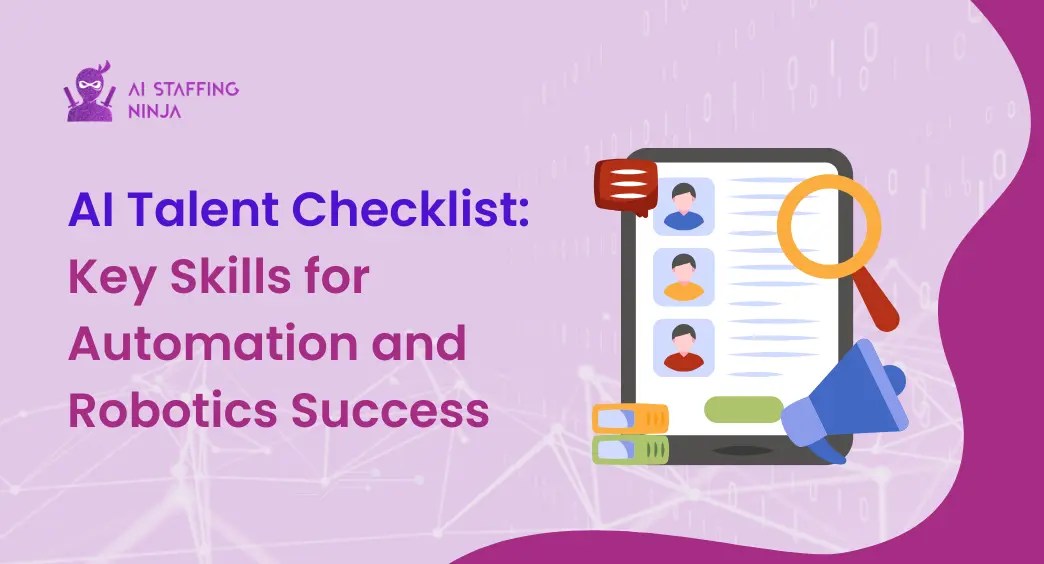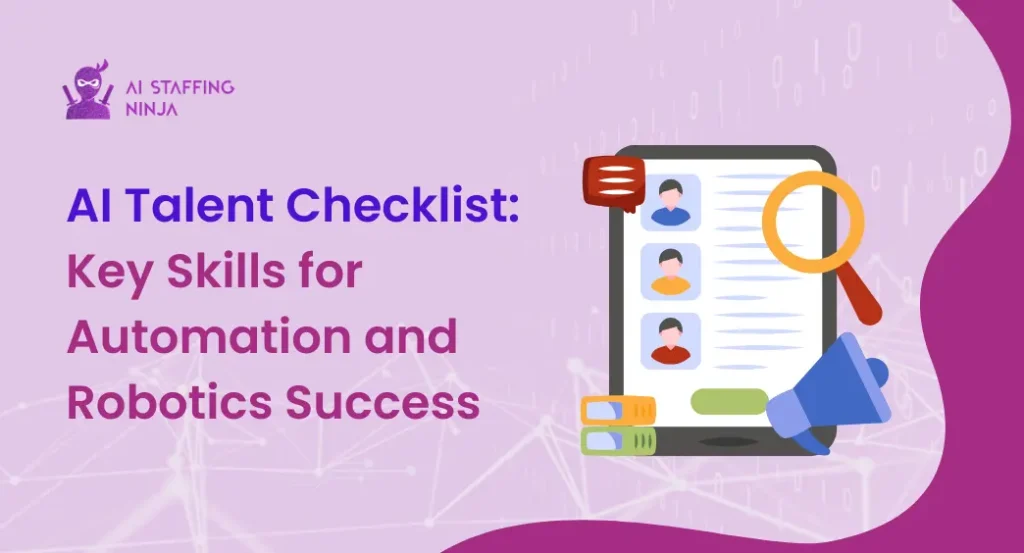
- By : By Staffing Ninja
Top Skills to Look for When Hiring AI Talent for Automation & Robotics Projects

AI is transforming robotics and automation in industries such as healthcare, manufacturing, and logistics. These sectors are already making massive moves towards AI-based tools for improving productivity and efficacy. However, unleashing the full potential of these technologies requires hiring the perfect candidate who can handle the difficult technical and strategic challenges of AI-enabled robotics work. In this post, we will show employers what skills, certifications, and best practices they should follow when hiring the best AI talent to automate their processes.
Core Technical Skills Required for Robotics and Automation
Having a firm understanding of technical expertise is essential to finding the proper talent for automation and robotics. Let’s examine the fundamental robotics skills required:
A. Programming for Robotics
Python, C++, and MATLAB programming languages are required for success in robotics. These are essential for the design, testing, and calibration of robotic devices. Understanding the Robot Operating System (ROS) environment is also required for developing high-performance, scalable robotic applications. ROS makes building easier as modules and components may be easily combined.
B. AI and Machine Learning in Automation Engineering
AI is the driving force behind smart automation. This includes a focus on the implementation of object recognition systems that allow robots to perceive and understand their environment, navigational devices that allow for free movement, and adaptive learning algorithms that enable robots to learn skills in real-time. Machine learning models are being used to optimize robotic performance. The use of ML and AI together improves robots’ capacity to learn, adapt, and make decisions.
C. Hardware and Robotics Skills
You should start from a strong hardware foundation, like how to combine sensors (cameras, lidar), control actuators (motors, grippers), and basic electrical engineering skills to solve problems. Deployment and operations require this hands-on automation engineering competency.
D. Robotics Process Automation (RPA)
RPA products such as UiPath and Automation Anywhere help automate repetitive tasks, especially in the workplace. They combine software and hardware automation, making robotic systems easily woven into an existing workflow.
Certifications and Educational Background to Prioritize
When hiring for robotics and automation roles, prioritize applicants with solid certifications in robotics and corresponding academic backgrounds.
A. Key Certifications
Check for candidates with certifications like Certified Robotics Professional (CRP), indicating they have a solid foundation in robotics concepts and practices. AI certification from an official institution such as Coursera or edX marks proficiency in artificial intelligence principles and methods. Automation training is imperative, and certifications in RPA development are highly desirable for positions that require software-based automation.
B. Educational Qualifications
A degree in Computer Science, Robotics, Electrical Engineering, or Mechatronics provides a solid foundation. They are particularly looking for candidates with advanced degrees or backgrounds in AI and robotics.
C. Importance of Continuous Learning
Artificial intelligence and robotics are on the exploding curve. For this reason, prioritize candidates who value learning and development. Knowledge of popular ML frameworks such as TensorFlow and PyTorch is an added advantage that showcases their hands-on skills and adaptability to new technologies.
Essential Soft Skills and Diverse Knowledge
Aside from technical competence, soft skills are essential for robotics and automation success.
A. Problem-Solving Abilities
Critical thinking is paramount. AI-driven robotics can present unexpected challenges. Engineers with strong problem-solving skills may efficiently discover defects, optimize system performance, and devise novel solutions to unforeseen challenges to increase system reliability and performance. To investigate a sensor problem, for instance, you could browse through data logs, try different hardware variations, or even change the algorithms.
B. Teamwork and Collaboration
Robotics projects are inherently interdisciplinary. Teamwork is crucial for merging the skills of software engineers (building control algorithms), mechanical engineers (building robots), and project managers (completing the work on time). This collaborative model streamlines the process and allows for efficient knowledge sharing and quicker project execution. A software engineer, for example, may use a mechanical engineer’s insight to validate the code that goes with the hardware.
C. Effective Communication
The ability to clearly convey complicated technical ideas to non-technical stakeholders, such as executives or customers, is vital. It includes project updates, technical challenges, and resource allocation decisions. For instance, effectively communicating the value of a particular AI algorithm to a management team requires excellent communication skills.
Industry-Specific Knowledge and Evolving Trends
When hiring the best robotics professionals, industry-specific knowledge and trend analysis are essential.
A. Industry Applications
Robotics influence is pervasive. The robot professionals are improving accuracy while reducing invasiveness in the medical field. Manufacturing is automated by robotics, and that is making things more efficient and consistent. Robotics and AI play a vital role in guiding and making decisions in self-driving cars.
B. Emerging Trends in Robotics
The field is rapidly evolving. IoT enables robot connectivity and remote control by sharing data among them. AI in automation is fuelling the development of smart factories, in which robots collaborate with human workers to produce more. Edge AI facilitates decisions to be made in real time as the data will be stored locally on the robot instead of transferring it to the cloud.
C. Regulatory Knowledge
The proper knowledge of safety and compliance protocols is key to safe robotics adoption. These guidelines can be learned and implemented safely and responsibly in any industry utilizing robots. This is especially important given the entrance of robots into high-demand industries such as medicine and driverless cars.
Job Roles and Career Opportunities in Robotics
The robotics and automation industry offers a wide range of diverse and exciting career opportunities.
A. In-Demand Roles
Hiring Robotics Engineers (engineering and building robots), hiring AI Engineers (integrating AI in automation processes), and hiring Machine Learning Engineers (programming AI algorithms for robots). The demand for new robotics job roles such as RPA Developers, who automate business operations with software robots, and Smart Systems Designers, who develop smart, connected systems, is also high.
B. Upskilling Requirements
Rapid robotics advances also require continuous training. Learning cryptography (for robotics security), advanced robotics (for creating more powerful, more complicated robots), and widely used AI frameworks (for designing and implementing AI algorithms) are valuable skills for advancing career opportunities.
C. AI Recruitment Agency Insights
Particular AI employment agencies can also assist companies in finding the right candidates with the necessary specialized skills for robotics work. These agencies utilize their AI staffing solutions expertise to identify and recruit highly skilled individuals, thereby addressing key skill shortages for high-level robotics projects. Such knowledge helps companies hire the right people for AI Robotics and AI Jobs in short order.
Role of Recruitment Services in Finding Ideal AI Talent
Expert AI recruitment services make robotics and automation hiring so much easier. AI recruitment agencies vet applicants beforehand, creating a candidate pool. This saves employers tons of time and money over separate searches. Employing an AI staffing agency can give you access to a much wider talent base, including those who don’t come along in abundance for their niche skills. Similarly, these agencies pair up candidates with technical and key soft skills based on the project requirement.
Final Thoughts
To conclude, recruiting the best candidates for robotics and automation is a multifaceted process. Look for candidates who have good technical skills (coding, AI/ML, hardware knowledge, RPA) as well as soft skills (problem-solving, collaboration, communication). To efficiently recruit the right people, leverage the help of niche recruitment firms that know how to attract technical and soft-skill talent that will succeed in this constantly evolving sector.